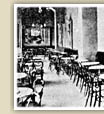|
During this crucial period - so critical for the survival of much of the urban and rural population, a period of unsettlement due to
war but also internal political crisis - changes can be observed
in the daily life of the people.
The city changed and new habits permeated the life of its inhabitants.
|

New facilities emerged, entertainment centres, cinemas, coffee shops and tea rooms,
that became even more attractive after the city was supplied with electric power.
The coffee shop held an important place is held in the life of the city, following a long
tradition in Athenian life. These were places frequented exclusively by men, who
held discussions on political issues, argued, especially in the period when political passions were heightened; but the coffee shops were also meeting places for men of letters and art.
Around 1900 romvia (a street stringed organ) made its appearance
on the streets of Athens, causing enthusiasm among the Athenians,
with musical motifs from Traviata and Rigoletto. Very
soon romvies were playing Greek songs, the hits of the time. The
emergence of the phonograph eventually put this aside, until it
was relegated to the poorest and isolated quarters.
|
 |

The romvia was followed by the barrel organ, which featured especially in taverns at night,
while nightime serenades could also often be heard. An agreable activity of the end of the nineteenth and the beginning
of the twentieth century were the homeric stone-throwing battles with a sling, which took place between the young of different quarters.
All the above appeared amid a climate of a lingering war that had often caused distress
to the population, swelling unemployment, poverty, insecurity and naturally
anxiety for the fate of the loved ones who were fighting at the front. During
the Balkan Wars, in particular, daily life was deeply affected by the climate of war.
|
 |
